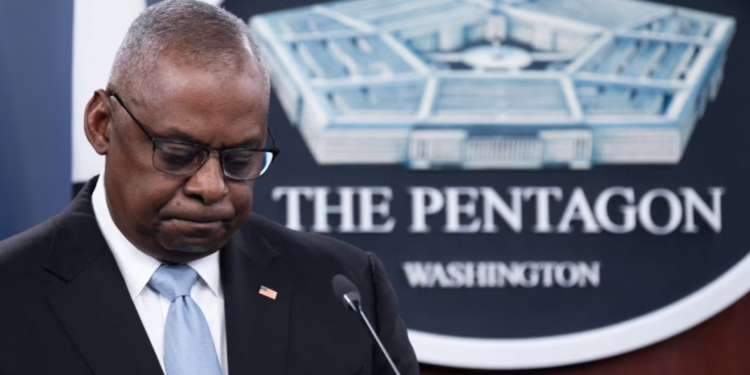Jan 16, 2025 Story by: Editor
WASHINGTON (AP) — A critical report released by the Pentagon’s inspector general on Wednesday found that Defense Secretary Lloyd Austin’s failure to notify Congress or the White House about his health issues—specifically his treatment for prostate cancer and subsequent complications—posed “unnecessary” security risks.
The report concluded that, despite the poor communication, no “adverse consequences” arose from the delay in informing key officials about Austin’s condition. However, it criticized Austin for keeping his hospitalization private for several days, even from President Joe Biden. It noted that Austin’s preference for privacy likely influenced his staff’s decision not to investigate his condition further.
The investigation, led by Inspector General Robert Storch, included text messages and calls indicating staff concerns about how and who to notify. It revealed conflicting recollections of events but did not uncover any major revelations in the findings, which were released just four days before Austin’s scheduled departure and President-elect Donald Trump’s inauguration.
In several instances, staff reported that Austin instructed them to keep his hospitalization confidential. However, Austin denied making such a request. In one example, he told a staff aide, “you’re more than welcome to ask (me) directly” if anyone had questions, which likely discouraged further inquiries, the report stated.
A security staff member also recalled Austin saying, “We’re not notifying anybody,” and emphasized keeping his medical situation as “private as possible.” This led to the decision not to inform his chief of staff or others about his condition.
The inspector general’s report concluded that Austin’s insistence on privacy regarding his medical treatment was compounded by his desire to avoid media attention. A Jan. 8 text to his chief of staff read, “I don’t want my health to be a media circus.”
Responding to the discrepancies between staff recollections, a senior defense official, who spoke on condition of anonymity, said it’s possible that different people interpreted or remembered conversations in varying ways. The official also stated that the department was unsure why the report was not released until the final week of the administration.
In a later exchange with Austin’s junior aide, Chief of Staff Kelly Magsamen expressed frustration, saying, “I wish (Secretary Austin) were a normal person but he’s the (secretary of defense). We have a big institutional responsibility. He can’t just go totally dark on his staff. … Please pass to him that we can’t keep his hospitalization a secret forever. It’s kind of a big deal for him to be in (the intensive care unit).”
Magsamen also mentioned that the White House and other officials had inquired about Austin’s whereabouts, and emphasized that they would need to be informed soon, adding that she was “uncomfortable” with the secrecy surrounding the situation.
While the inspector general’s report concluded that there were no serious repercussions from the delayed communication, it also noted that the risks to national defense were heightened unnecessarily, including potential impacts on command and control of critical Department of Defense operations.
Austin did not notify Congress or the White House about his initial prostate cancer treatment in December 2023, nor did he inform them about his complications on January 1, 2024, when he was rushed to Walter Reed Army National Military Medical Center.
These findings echoed criticisms from an internal review conducted shortly after Austin’s hospitalization, which largely cleared individuals involved of any wrongdoing, stating there was “no indication of ill intent or an attempt to obfuscate.”
Although Austin transferred decision-making responsibilities to Deputy Secretary Kathleen Hicks during his surgery and again while in intensive care, he did not provide her with an explanation for the transfers and failed to notify the White House.
The situation sparked anger at the White House and led to bipartisan criticism from Congress. Lawmakers called Austin to Capitol Hill for a hearing, where they demanded accountability. Austin later admitted responsibility in a lengthy press conference after returning to work. He acknowledged that while he never instructed his staff to keep his hospitalization secret from the White House, he should have handled the situation differently and expressed regret for keeping President Biden and others uninformed.
Austin, diagnosed with prostate cancer in early December 2023, underwent surgery on December 22. On January 1, 2024, he was taken to Walter Reed by ambulance due to significant pain and was moved to the intensive care unit the following day.
Pentagon officials confirmed that public affairs and defense aides were notified on January 2 about Austin’s hospitalization, but the information remained confidential. Military service leaders and the National Security Council were not informed until January 4, at which point President Biden was briefed. It wasn’t until January 8 that the reasons for Austin’s hospitalization were publicly disclosed.
The internal review prompted calls for procedural changes to improve communication and prevent similar incidents in the future. Additionally, the White House adjusted federal guidelines as a result of the situation. Source: AP News

















